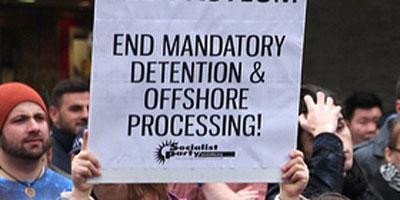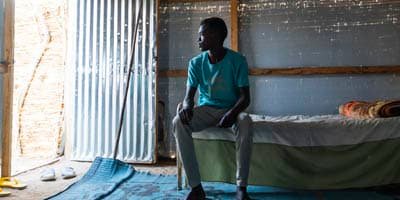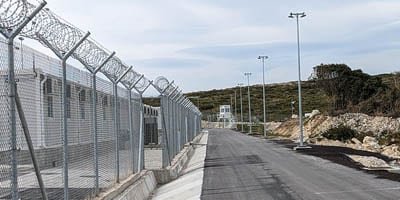
2013 was the first time since World War II that the number of asylum seekers and displaced people in the world reached more than fifty million. In light of the masses of people seeking asylum, Australia’s policy towards asylum seekers has been one of deterrence.
Since the 1990s, Australia has had a policy of mandatory detention of anyone in the country illegally – the only country in the world to do so. International human rights organizations have repeatedly criticized the detention camps, in which it is claimed that human rights violations regularly occur.
During detention, no distinctions are made between adults and children. An inquiry in July 2014 showed that one third of children held in camps suffered from mental illness, as a result of prolonged detention.
Last year Australia implemented a new policy of refusing to allow boats carrying asylum seekers to land at all. The purpose of Operation Sovereign Borders, as it is called, is “to turn back boats where it is safe to do so; increase capacity at offshore processing centres; and lease and deploy additional vessels to relieve patrol vessels of passenger transfers,” according to a government press release.
Not criminals, but kept in detention
“2014 is the worst time to be an asylum seeker in Australian history,” says Paul Power, CEO of the Refugee Council of Australia.
Boat arrivals are taken for detention in third countries: Papua New Guinea, Malaysia and outlying Pacific Islands such as Nauru and Manus. The extraterritorial processing sites had been closed in 2008 due to reports of inhumane conditions, but were re-opened by a different government in 2012. In 2014 the average time spent in detention reached an all-time high, 305 days.
An example is Case Study 18 a study by the Asylum Seeker Resource Centre:
“An asylum seeker from the Middle-East who fled persecution following religious conversion applied for a Protection visa one week after arriving in Australia. Because he arrived without valid documents he was detained. He spent two and a half years in immigration detention prior to being successful at the Refugee Review Tribunal on his third hearing. The asylum seeker continues to question ‘how long’ it took to arrive at this outcome and why he had to be detained.”
The refusal of refugee protection
Paul Power says that Australia is not meeting its responsibilities as a Refugee Convention signatory by not allowing asylum seekers to ask for refugee protection.
“By blocking asylum seekers and deflecting its responsibilities to other countries, Australia is setting a poor example for those countries in the region that need encouragement and support in building refugee protection frameworks,” he says.
“Australia needs to adopt alternatives to detention while their refugee status is being determined. The practice of offshore processing must end and the Australian Government must increase the focus on building regional cooperation on refugee protection.”
In July 2014, forty one Sri Lankans seeking asylum in Australia were refused without an evaluation of their claims. In a press release, Ravina Shamdasani, spokesperson for the UN High Commissioner for Human Rights, criticised the decision. “It is unclear whether the Australian Government has been given any assurances that the returnees will not face ill treatment upon their return to Sri Lanka, nor is it clear how the Australian Government plans to monitor their treatment,” she said.
Conditions in Nauru
In August 2014, 157 accepted refugees were flown to be settled in Nauru, a small island country that accepts Australian aid in return for hosting a detention center. The Australian government is using this case as a success story under Operation Sovereign Borders. “This was the first people smuggling venture whose passengers were transferred to Australian immigration authorities in over seven months,” a government statement claimed in August 2014.
However, the environment in the Nauru settlement was described in a statement by fifty refugees settled there as worse than in other detention centres:
“Drinking water is a basic need for human life. Here the water to drink is not clean. Australia sends good water for the government workers here but tells us to boil bad water. This water makes us sick… Why are we treated as less than human? They treat us like we are animal… Here we are dying slowly. Here the conditions are worse than the processing centre. Hear our voices.”
The relative remoteness of detention camps and settlements means that the lives of asylum seekers go relatively unobserved, despite complaints of lack of safe drinking water, inadequate sanitation, sexual abuse and inadequate medical provisions.
Paul Power believes that a regional approach could be the solution. “At a time when there is a pressing need for nations in the Asia-Pacific region to be working together to improve the protection of people who have been forced to flee persecution, Australia is instead making it harder for refugees to get to a place of safety.”



